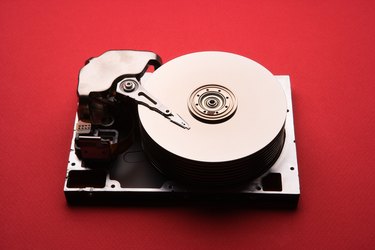
Computer operating systems, such as Windows, allocate space on the hard drive as adjacent groups of sectors, known as allocation units, or clusters. When you create a new file, the operating system finds available space and allocates that space to the file. Unallocated space is space that is not allocated to active files within a file system.
Deleting Files
Video of the Day
If you delete a file, the operating system unallocates the space originally allocated to the file, by removing the pointers to it, and marks that area of the hard drive as available for reuse. The operating system does not, however, delete the data that the file contained and the data remains in unallocated space until the operating system stores another file in the same space, thereby overwriting the data. In other words, unallocated space contains data from all the files that have been deleted, but not yet overwritten.
Video of the Day
Residual Data
Unallocated space potentially contains complete and partial files that can remain untouched for long periods of time. The residual data cannot be viewed by an ordinary computer user, but can be discovered and extracted using data recovery or computer forensics software utilities. As such, the data left behind in unallocated space can be a source of computer evidence or a potential security risk, if the data is of a sensitive nature.
Formatting & Partitioning
Many computer users are unaware that, even if they format the hard drive of computer -- perhaps prior to donating it to charity -- all of the data in unallocated space can be easily identified and extracted by anyone with a mind to do so. The same applies if the user repartitions the disk, using fdisk, or a similar utility, and installs a new operating system; unallocated space may still contain all of the data related to past email messages, documents and other sensitive files.
Using Unallocated Space
The type of object that you can create in unallocated space depends on whether your hard disk is a basic disk, containing primary partitions, extended partitions and logical drives, or a dynamic disk, containing volumes that span multiple disks. In the case of a basic hard disk, you can use unallocated space outside an existing partition, or logical storage unit, to create a primary partition -- typically, the partition used to start the operating system -- or an extended partition. Similarly, you can use unallocated space inside an existing partition to create logical drives, or parts of the same physical disk that are managed as independent units.